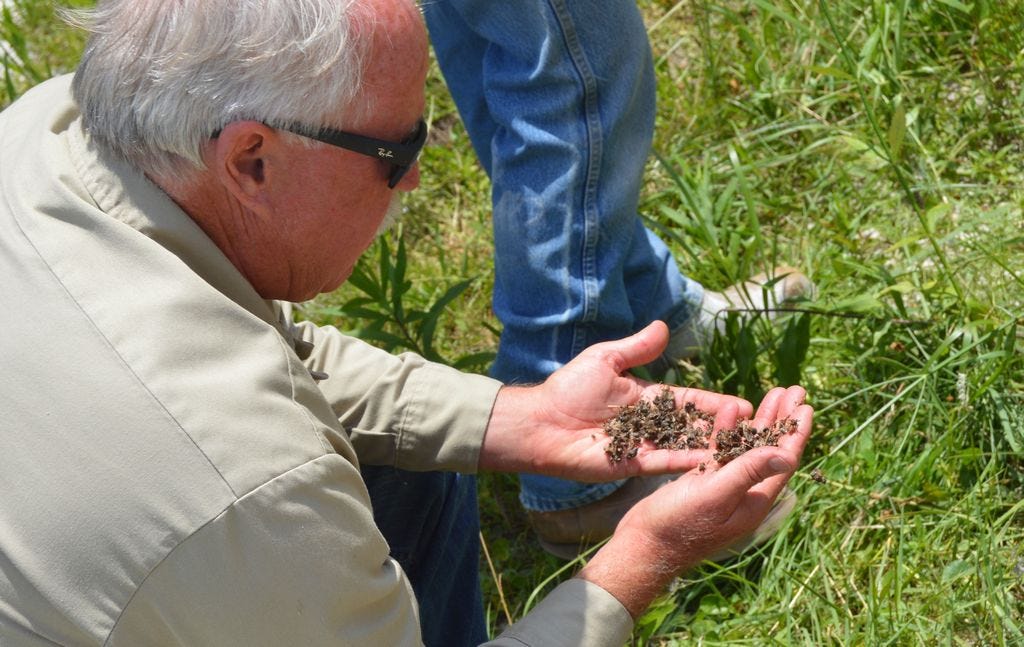
MILTON — Santa Rosa Beekeepers Association members urge residents to use caution when using pesticides on their properties.
Buck Waters, who operates a collection of beehives off Avalon Boulevard recently discovered hundreds of dead bees outside.
GALLERY: Photos of Waters and other SRBA members observing dead bees>
“(The bees) got into something, that is fact, and they died,” Waters said. “This is a classic picture of a pesticide kill, a carpet of dead bees in front of your hive.”
WATCH: Video Waters shows impact of large bee kill>
‘IT’S GOING TO BE A PROBLEM'
Waters, along with several SRBA members, believe increased pesticide use is caused by the recent scare of the Zika virus, which is commonly associated mosquitoes.
“The pesticides they are using to spray for these mosquitoes is deadly to the bees,” SRBA Vice President Clarence Prater said. “These private foggers are going around spraying. When they spray the bushes and the flowers these bees work, it kills them dead.”
Prater said harmful insecticides are also being dispersed into roadside ditches, a common area where bees receive water. From there, the bees transport to a hive and spread the chemicals, causing hundreds of bees’ deaths.
In addition to reading labels on pesticides before purchase or use, SRBA members encourage residents with some helpful insight, like use caution with such products like Bifen IT, or Sevin Dust, avoid spraying during the day when bees are actively outside, and find alternatives to using pesticides.
Dr. Malcolm T. Sanford, with the University of Florida, suggests these tips to prevent poisoning bees with pesticides.
●Use pesticides only when needed
●Do not apply pesticides while crops are in bloom
●Use less toxic compounds, formulations
●Identify attractive blooms which attract bees
●Notify beekeepers of any pesticide applications
Local beekeepers welcome residents to contact them or visit their monthly meeting and ask them any questions before taking action.
Preserving the bee population is important, especially for pollinating, according to beekeepers.
“Where are you going to get your fruits and vegetables (when the bees are gone)? Waters said.
SRBA President Bill Blankenship agreed.
“It’s going to be a problem in a larger portion that is going to be noticeable,” Blankenship said. “I am already paying $1 for a tomato; We could be paying $5 or $6 for a tomato, pear or apple, just because we don’t have pollinators.”
BEYOND THE COUNTY
Ronald Hixson, Santa Rosa County Mosquito Control’s environment manager, said spray technicians do not spray on major roadways like Avalon Boulevard. They concentrate only on residential neighborhoods.
Hixson also said the county department urges beekeepers to contact the mosquito control office for notification.
“We can enter that address on a GPS which is used by our spray technicians,” he said.
Hixon believes the county does not use pesticides aimed at harming bees. However, that does not rule out private pest control businesses.
“Those companies are licensed by the state,” he said, adding the county does not oversee their operations. The same could be said for residents who purchase and use pesticides.
Blankenship agreed, stating the problem might be connected to individuals uninformed in using pesticides.
“I really believe our problem is coming from beyond the county,” he said. “Anyone can put on a backpack and put some poisons in there and not even know what they are using, not knowing what the after effects are.”
With county officials’ assistance, Waters soon hopes to find the exact cause of the bee kill. Waters said he is relocating the hives elsewhere from Avalon Boulevard.
Hixson said the local mosquito control office has yet to find a Aedes Aegypti mosquito — the common type of mosquito that transmits the Zika virus — within the county.
There has only been one reported case of Zika confirmed in Santa Rosa County, which was believed to have been contracted outside the state.
This article originally appeared on Santa Rosa Press Gazette: Beekeepers concerned over pesticide use (PHOTOS, VIDEO)
